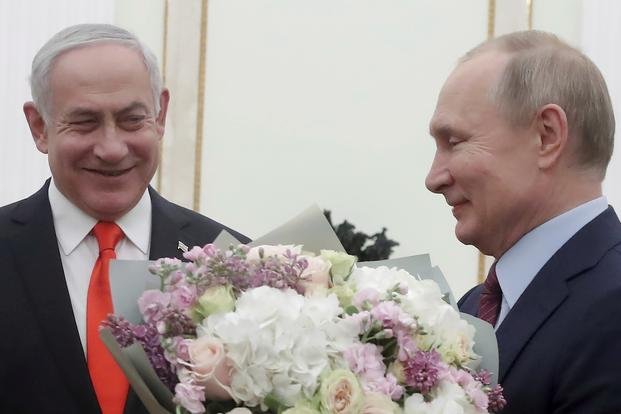The Israel-Hamas war has forced Russia into a delicate balancing act, with Moscow urging a quick end to the fighting without apportioning blame.
The careful stand is due to Russia’s long ties to Israel, the Palestinians and other regional players, and it reflects the Kremlin’s hope to expand its clout in the Middle East by playing peacemaker.
Russia also tried to cast the hostilities as a failure of U.S. policy, and it hopes they will be a distraction for Washington and its allies from keeping up military support for Ukraine.
A look at the Kremlin’s messaging about the war and its relations with those in the region:
What is Russia saying about the war?
President Vladimir Putin said the war was rooted in the inability to create a sovereign Palestinian state in line with U.N. resolutions that he called a “gross injustice.” He noted that Israel’s settlement policies have exacerbated the situation.
Putin called it a reflection of what he called a glaring failure of the Washington’s peacemaking efforts, charging the U.S. has focused on offering economic “handouts” to Palestinians while paying little attention to their fundamental issues related to statehood.
He urged the Israeli government and Hamas not to target civilians and emphasized that every effort must be made to quickly end the war, saying an escalation would raise grave risks.
The carefully calibrated statements by Putin and his lieutenants reflect an effort by Moscow to maintain good ties with both Israel and the Palestinians. Kremlin spokesman Dmitry Peskov emphasized that Moscow must maintain a “balanced approach” and talk to both parties, noting that it should allow Russia to help broker a settlement.
While jockeying as a potential peacemaker, Moscow also hopes the fighting will distract Washington and its allies from the war in Ukraine and eventually erode Western support for Kyiv.
Peskov even taunted Ukrainian President Volodymyr Zelenskyy, saying he must feel jealous about how the U.S. is now forced to focus on military assistance to Israel.
How has Moscow’s Mideast policy evolved?
Throughout the Cold War, Moscow strongly backed the Palestinians and other allies in the Arab world against Israel, giving them military and political support.
The Soviet Union broke diplomatic ties with Israel after the 1967 Arab-Israeli war. Moscow’s policies began to shift as Soviet leader Mikhail Gorbachev reshaped foreign policy and relations with Israel were restored shortly before the 1991 collapse of the USSR.
In the decade after the Soviet breakup, Russia’s global influence ebbed amid an economic meltdown and political turmoil that forced the Kremlin to turn inward.
After Putin took power, he sought to revive old Middle Eastern alliances while maintaining warm ties with Israel. Russia joined a quartet of Middle East peacemakers along with the United States, the European Union and the United Nations, but it played a minor role in efforts, compared with the U.S.
In 2015, Moscow sent its warplanes and troops to its old ally, Syria, teaming with Iran to shore up President Bashar Assad’s regime amid a civil war. The Russian intervention allowed Assad to reclaim control over most of the country and helped expand Moscow’s clout in the Middle East.
How close are Russia and Israel?
After the Soviet breakup, Russia and Israel have steadily expanded trade and other contacts and strengthened their security ties.
More than 1 million people from Russia and other parts of the former Soviet Union have moved to Israel, a development that Russian and Israeli officials described as a major factor in cementing ties.
Moscow’s relations with Israel remained strong amid Russia’s operations in Syria even as the Israeli military frequently attacked Iranian forces that had teamed up with Russian troops in the country.
Even though Russian and Israeli militaries maintained deconfliction channels amid the fighting in Syria, a Russian reconnaissance aircraft was shot down in 2018 by Assad’s forces responding to an Israeli airstrike, killing all 15 people aboard, an incident that briefly strained ties.
Putin’s invasion of Ukraine has posed a major test for Russian-Israeli relations. Israeli authorities have walked a fine line, voicing support for Kyiv but refusing to provide it with weapons. Many Israelis were angered by Putin’s claim that Zelenskyy, a Jew, was actually a neo-Nazi. The Russian president also has praised Israeli mediation efforts early in the fighting.
Israeli Prime Minister Benjamin Netanyahu explained his government’s reluctance to send military equipment to Kyiv by emphasizing the need to maintain security contacts with Moscow in Syria and voicing concern the weapons supplied to Ukraine could end up in Iranian hands, a statement that angered Ukrainian officials.
How did Russian-Palestinian ties evolve?
During the Cold War, Moscow was the Palestinians’ main backer, offering them political, economic and military support. The Soviet Union provided generous subsidies, helped train Palestinian forces and provided them with weapons.
While those ties weakened after the Soviet Union’s collapse as the Kremlin focused on domestic challenges, Putin has moved to revive them.
Moscow has repeatedly hosted Palestinian leader Mahmoud Abbas, but also has reached out to Hamas. Several Hamas leaders have visited Moscow, including Ismail Haniyeh, who held talks with Russian Foreign Minister Sergey Lavrov in September 2022.
Where do Russia and Iran cooperate?
The leaders of Iran’s 1979 Islamic Revolution denounced the Soviet Union as a “lesser Satan” as opposed to “the great Satan” — the United States. But after the the Soviet collapse, Russia and Iran forged close ties. Moscow built Iran’s first nuclear power plant and deepened ties with Tehran as its tensions with the West soared.
Relations with Iran grew even closer amid the Syrian war when they teamed up to back Assad’s government.
Amid the war in Ukraine, Iran has provided Moscow with hundreds of Shahed exploding drone s that the Russian military has used against Ukraine’s energy facilities and other key infrastructure. Iran also has reportedly shared its drone technology with Russia, which built a facility to produce them.
In return, Moscow is expected to offer Iran advanced fighter jets and other modern weapons.
What other alliances has Moscow sought?
As part of efforts to expand its global clout, Russia has moved to bolster ties with Iran’s main regional rival, Saudi Arabia.
Even though Russia backed Syria’s Assad while the Saudis were backing his foes, Moscow and Riyadh have managed to narrow their differences on Syria and expand cooperation on other issues.
Putin has forged strong personal ties with Saudi Crown Prince Mohammed bin Salman, and the two edged closer as U.S.-Saudi relations became mired in disputes in recent years.
Putin’s ties with bin Salman paved the way for an OPEC+ deal to cut oil output that was spearheaded by Moscow and Riyadh and helped bolster sagging oil prices to the benefit of oil producing countries.
Story Continues






